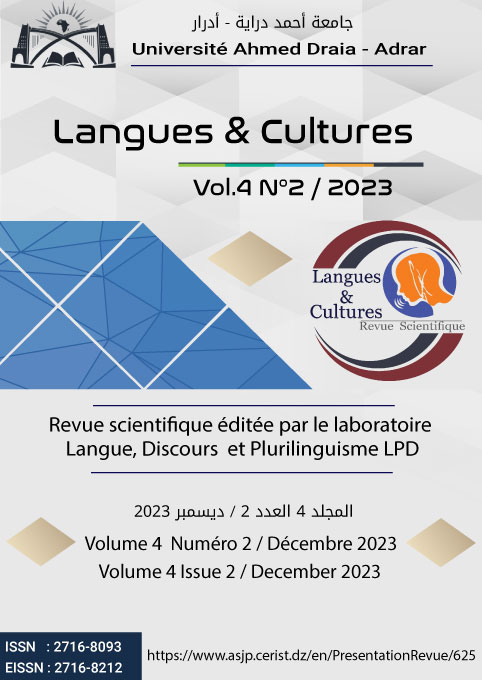Decolonizing the Discourse of Coloniability from the Algerian Intellectual Mind: Coping with Algeria Pre-colonial Past
Décoloniser le discours de coloniabilité de l’esprit intellectuel algérien : Faire face au passé précolonial de l’Algérie
Abstract
Post colonial theorists (Frantz Fanon, 1952, 1963; Edward Said, 1978; Homi Bhabha, 1994, among others) observed that despite the ceremonial departure of the colonizers, some independent states still adhere themselves to the colonial discourse, which tend to persuade them about its superiority over them and their inferiority in everything, and thus their inability to manage their lives without their colonizer. Like many postcolonial states, in Algeria, this form of adherence can be seen today through many aspects of life, in which dismissing the own local language and culture as backward, due to the internalization of the colonial ideology, and preferring everything that is Western are a subject of this psychological complex. In explaining such phenomenon, concepts like mimicry, imitation, and otherness popularized by Frantz Fanon, Homi Bhabha and others are widely used. However, the important point to be discussed here is that if ‘the way the colonizer constitutes knowledge about the colonized’ has been termed as ‘colonialism discourse' because it was achieved through 'military and institutional powers', what proper term can be used for ‘the adoption of colonial discourse in the identification of the self’? Reducing the problem to imitation or mimicry has become irrelevant. An alternative term need to be articulated. I use the term “Discourse of Colonisability” to refer to the acceptance and application of the old colonial discourse on the self-presentation, which used to be useful in time of colonialism and has become useful for today's imperial powers. Therefore, this paper attempts to discuss the issue of colonisability and definitions of the self that emerged in Algeria after the departure of the French colonialism. In this paper, we argue that this self-presentation discourse has to do with the French colonial policies in Algeria and has to do with the lack of knowledge about Algeria's pre-colonial cultural and intellectual past that had been deliberately destroyed and wore off from the Algerians' memory after the French arrival. To diagnose the issue, this research used an inductive and analytical approach by relying on collecting some historical and philosophical documents that dealt with subject and related them to the context being treated.
Résumé
Les théoriciens post coloniaux (Frantz Fanon, 1952, 1963; Edward Said, 1978; Homi Bhabha, 1994, entre autres) ont observé que malgré le départ cérémoniel des colonisateurs, certains États indépendants adhèrent toujours au discours colonial, qui tendent à les convaincre de sa supériorité sur eux et de leur infériorité en tout, et donc de leur incapacité à gérer leur vie sans leur colonisateur. Comme de nombreux États postcoloniaux, en Algérie, cette forme d’adhésion se manifeste aujourd’hui à travers de nombreux aspects de la vie, dans laquelle le rejet de la langue et de la culture locales comme arriérées, en raison de l’intériorisation de l’idéologie coloniale, et préférer tout ce qui est occidental sont un sujet de ce complexe psychologique. Pour expliquer ce phénomène, des concepts comme le mimétisme, l’imitation et l’altérité popularisés par Frantz Fanon, Homi Bhabha et d’autres sont largement utilisés. Cependant, le point important à discuter ici est que si « la façon dont le colonisateur constitue la connaissance des colonisés » a été qualifiée de « discours colonialiste » parce qu’elle a été réalisée par des « pouvoirs militaires et institutionnels », quel terme approprié peut-on employer pour « l’adoption du discours colonial dans l’identification du soi »? La réduction du problème à l’imitation ou au mimétisme n’est plus pertinente. Il faut formuler un autre terme. J’utilise le terme « Discours de colonisation » pour parler de l’acceptation et de l’application de l’ancien discours colonial sur l’auto présentation, qui était utile à l’époque du colonialisme et est devenu utile aux puissances impériales d’aujourd’hui. Par conséquent, ce document tente de discuter de la question de la colonisation et des définitions de soi qui sont apparues en Algérie après le départ du colonialisme français. Dans le présent article, nous soutenons que ce discours d’auto déclaration a à voir avec la politique coloniale française en Algérie et avec le manque de connaissances sur la situation le passé culturel et intellectuel colonial qui avait été délibérément détruit et effacé de la mémoire des Algériens après l’arrivée des Français. Pour diagnostiquer la question, cette recherche a utilisé une approche inductive et analytique en s’appuyant sur la collecte de certains documents historiques et philosophiques qui traitent du sujet et les relient au contexte traité.


5.jpg)







